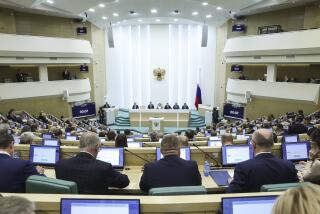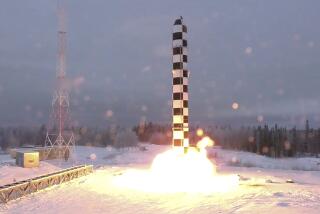U.S. Won’t Join Soviet Moratorium
- Share via
WASHINGTON — The United States today formally announced it will not join in an extended Soviet nuclear test moratorium, but President Reagan said he was grateful for a new Kremlin arms-control offer.
Both the White House and Defense Secretary Caspar W. Weinberger said the United States is determined to go ahead with its Strategic Defense Initiative, popularly called “Star Wars,” despite Soviet pleas to drop it.
Weinberger told a news conference it was “very, very worrisome” that the Soviet Union continued to link its arms-reduction proposals to an end to the Star Wars program.
He and White House spokesman Larry Speakes said the United States had to pursue its nuclear weapons testing, which officials say is largely devoted to experiments with hydrogen bomb-powered Star Wars lasers.
Soviet Tests Not Needed
“The Soviet Union now does not need to test. It is important for us to test,” Speakes told reporters.
He added that Reagan remains “totally committed” to SDI.
Soviet leader Mikhail S. Gorbachev on Wednesday proposed a 15-year schedule for eliminating nuclear weapons and extended Moscow’s five-month unilateral test ban for three months.
He made clear that the disarmament process envisaged depended on the United States abandoning the SDI anti-missile space shield concept.
Answering shouted questions from reporters at a picture session in the Cabinet Room today, Reagan said he was “very grateful” for a letter from Gorbachev outlining his new plan and that it would be studied carefully.
Proposal Encouraging
Asked if he was encouraged by the proposal, made on the eve of superpower arms reduction talks that reopened in Geneva today, he replied: “Yes . . . it’s different from anything that we have heard in the past and it’s just about the first time anyone’s proposed actually eliminating nuclear weapons.”
In a White House statement Wednesday night, Reagan noted he had proposed the total abolition of nuclear weapons in a speech to the Japanese Parliament two years ago. He said Gorbachev’s plan was a response to a series of U.S. arms control initiatives. (Story on Page 14.)
Weinberger said today there were some elements in Gorbachev’s proposal that looked positive and might advance progress toward 50% cuts in the superpower nuclear arsenals stated as a goal by Reagan and Gorbachev at their “fireside summit” in Geneva last November.
“There are some other things in it that we find very, very worrisome. One of them is the continued linking of any arms reduction to a ban on our proceeding with the SDI program,” Weinberger said.
More to Read
Sign up for Essential California
The most important California stories and recommendations in your inbox every morning.
You may occasionally receive promotional content from the Los Angeles Times.













